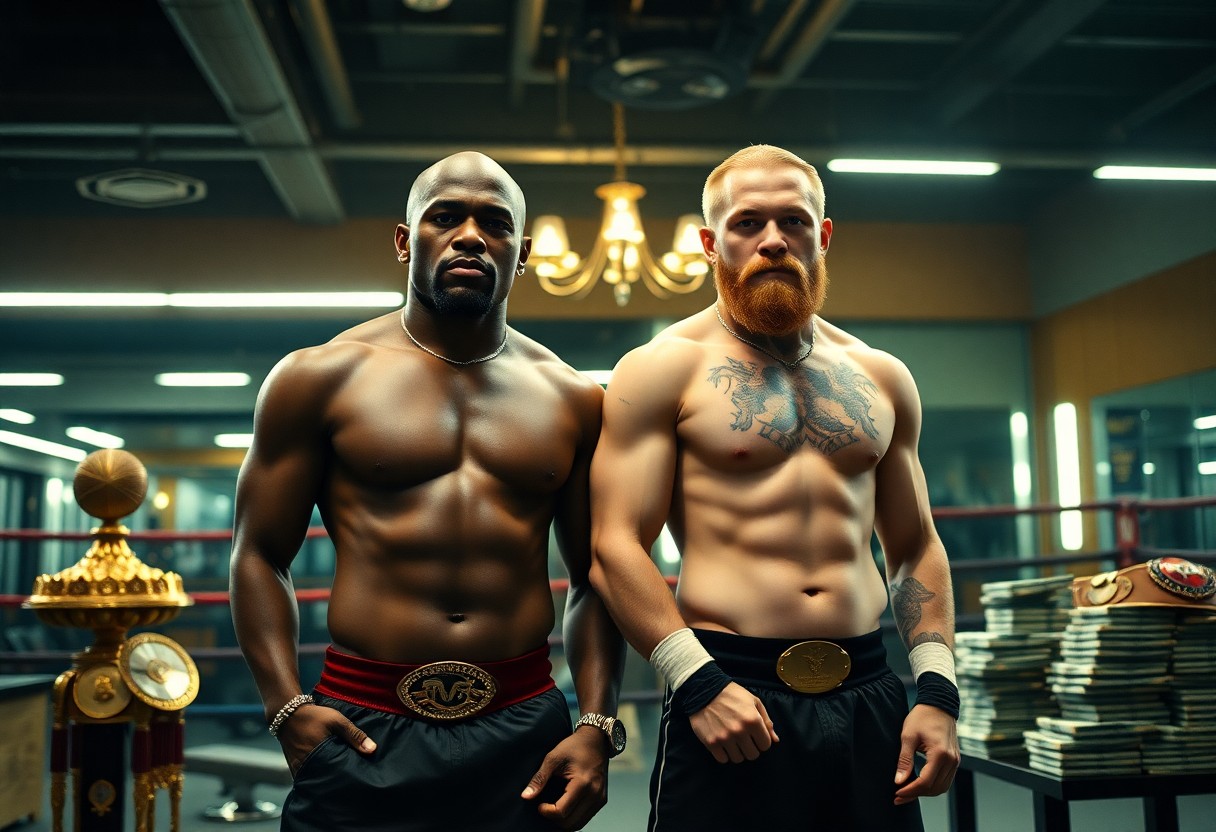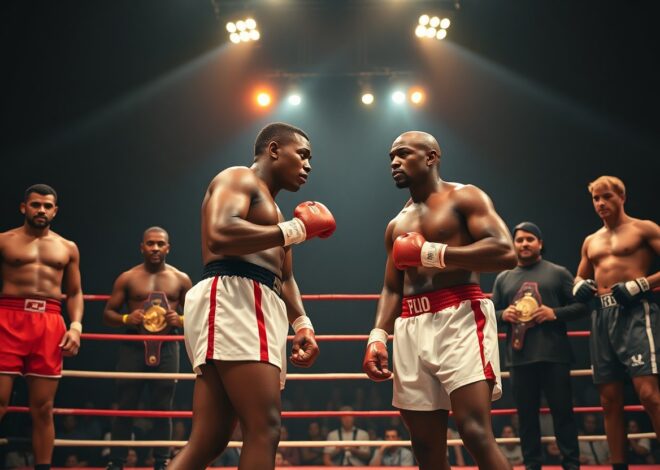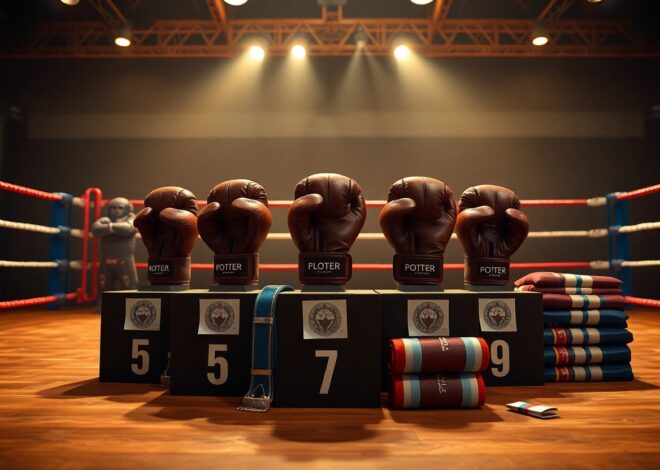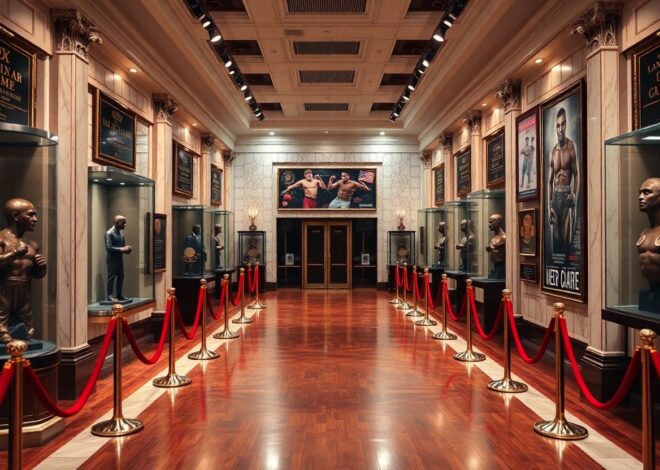
Money, Legacy, And Fame: What Drives Fighters Like Floyd Mayweather And Conor McGregor?
Many combat sports enthusiasts ponder what motivates elite fighters like Floyd Mayweather and Conor McGregor. Their journeys are defined by a relentless pursuit of wealth, a quest for immortal legacy, and the allure of global fame. While Mayweather emphasizes financial success with his undefeated record, McGregor showcases charisma alongside a drive for historical impact. Understanding these factors reveals the complex interplay of ambition and personal branding that transforms them into icons, beyond the ring and into public consciousness.
The Pursuit of Money
The allure of significant financial gain drives many fighters to the top of their game. For athletes like Floyd Mayweather and Conor McGregor, the pursuit of money often eclipses other motivations. Winning titles may earn respect, but securing lucrative fight deals, pay-per-view percentages, and performance bonuses transforms their careers into multimillion-dollar enterprises. The lifestyle that comes with wealth—luxurious homes, private jets, and high-end cars—creates an incentive that many strive for in the unforgiving arena of combat sports.
Financial Incentives for Fighters
Financial rewards in professional fighting are not merely supplementary; they serve as a primary motivator. Fighters negotiate contracts that frequently include *base pay*, *win bonuses*, and *performance incentives*, with top-tier athletes like Mayweather reportedly earning over $300 million from a single match. The staggering amounts involved push fighters to continuously elevate their performance and engage in strategic branding, solidifying their financial futures.
The Role of Endorsements and Sponsorships
Endorsements and sponsorships play a pivotal role in a fighter’s revenue stream, often surpassing fight purses. High-profile fighters attract brands eager to capitalize on their public personas, resulting in deals worth millions. For instance, McGregor’s partnership with Reebok and his launch of Proper No. Twelve whiskey showcase how fighters leverage their fame to create lucrative business ventures that enhance their financial portfolios.
In the competitive landscape of combat sports, endorsements and sponsorships can significantly elevate a fighter’s income. Mayweather’s strategic partnerships with brands like Hublot and the multi-year deal with the MGM Grand highlight the financial potential beyond the ring. These alliances also foster long-term brand loyalty, allowing fighters to retain a stable income post-career. Strategic self-promotion and marketability directly influence the size and number of sponsorship deals, positioning fighters as influential figures, both inside and outside the sport.
Legacy and its Significance
For fighters, legacy transcends mere statistics; it embodies the narrative they leave behind in the world of combat sports. A lasting legacy is measured not just in titles or accolades, but in the impact on culture and the sport itself. Fighters aim to be remembered for their contributions, skills, and the indelible mark they leave on future generations.
Defining Legacy in Combat Sports
In combat sports, legacy is often defined by a fighter’s accomplishments, the respect garnered from peers, and the influence on aspiring athletes. Legends like Muhammad Ali and Mike Tyson showcase how victories in the ring intertwine with personal stories and broader social issues, crafting a legacy that resonates beyond their era.
Fighters’ Perspectives on Legacy
Fighters approach the concept of legacy from various angles, often reflecting on their journey and the values that underlie their careers. While some prioritize records or championships, others focus on the integrity of their actions and the impact they have on fans and young fighters alike.
A common sentiment among fighters is that legacy is not only about individual achievements but also about the respect earned within the community. For instance, Conor McGregor openly discusses the importance of being a trailblazer in the sport, aspiring to inspire others through his journey. Similarly, Floyd Mayweather often emphasizes the significance of undefeated status, which he views as a hallmark of success and respect in boxing. These diverse perspectives illustrate that legacy is a multifaceted construct informed by personal goals, societal impact, and the desire to inspire others in the brutal yet beautiful world of combat sports.
The Role of Fame
Fame acts as a double-edged sword for fighters, offering both opportunities and challenges. For athletes like Floyd Mayweather and Conor McGregor, fame not only enhances their earning potential but also shapes their public persona. The pursuit of celebrity status often drives fighters to seek high-profile bouts and create captivating narratives that resonate with fans, ultimately ensuring their spotlight remains bright.
How Fame Influences Fighters’ Decisions
Fame significantly impacts fighters’ strategies and choices, leading them to prioritize high-stakes matches and controversial builds. The demand for entertaining personas often compels them to engage in trash talk or elaborate promotional stunts, as seen in the intense build-up to McGregor’s fights. Such tactics can elevate their profile and ensure lucrative opportunities, but may also divert focus from their core athleticism.
Public Perception and Media Impact
The media landscape plays a pivotal role in shaping public perception of fighters, effectively crafting their legacy in real-time. Positive coverage can enhance a fighter’s marketability, while negative narratives often lead to significant backlash. The journey from the fight announcement to post-bout analysis is filled with media scrutiny, which can influence fan loyalty and sponsorship opportunities.
In today’s digital age, public perception can shift dramatically within hours, as prominent fighters are often subjects of viral discussions online. Social media platforms amplify their voices, allowing them to influence fan engagement directly. This visibility can lead to increased profits through sponsorships and merchandise sales. However, the pressure to maintain a polished image means that scandals or missteps can rapidly alter public sentiment, exemplifying the precarious balance fighters must navigate between fame and reputation.
The Intersection of Money, Legacy, and Fame
For fighters like Floyd Mayweather and Conor McGregor, the quest for success encompasses not just financial reward but also the pursuit of a lasting legacy and heightened fame. This intersection fuels their ambitions, shaping not only their careers but also their personal philosophies. The balance of these elements becomes a defining characteristic, pushing them to achieve feats that resonate beyond the confines of the ring.
Balancing Financial Gain with Personal Values
A sustained focus on financial success can sometimes clash with personal values. Fighters face the challenge of aligning their drive for wealth with principles like integrity and authenticity. The ability to manage this tension determines how their public personas evolve and influences their decisions both inside and outside the ring.
Case Studies: Mayweather and McGregor
Examining the careers of Mayweather and McGregor reveals distinct approaches to managing fame, fortune, and legacy. Mayweather, known for his perfect record and opulent lifestyle, often prioritizes financial gain, boasting a net worth of approximately $450 million. In contrast, McGregor, while also financially successful with a net worth around $200 million, emphasizes brand expansion and cultural impact. Both fighters embody the complex interplay of these driving factors, showcasing their unique contributions to the world of combat sports.
- Floyd Mayweather: Perfect 50-0 record, earned over $1 billion in career earnings, highest-paid athlete in 2015 (estimated $300 million).
- Conor McGregor: 2016 estimated earnings at $34 million, $3.5 billion valuation for his whiskey brand, first UFC fighter to become a billionaire.
- Legacy: Mayweather’s defensive style revolutionized boxing, while McGregor popularized MMA globally, contributing to UFC’s rise.
- Branding: Mayweather promotes his fights aggressively; McGregor’s charismatic persona has turned him into a global icon.
Mayweather’s financial focus is evident in his fights, often commanding record-breaking purses, while McGregor has leveraged his fame into ventures outside the ring, such as his successful whiskey brand. Their contrasting paths illustrate the multifaceted motivations of elite fighters; both have achieved unparalleled success, yet their legacies are intertwined with how they perceive and integrate money and fame into their lives. Their case studies serve as examples of how financial pursuits don’t always overshadow the quest for enduring impact.
Cultural and Social Implications
The triumphs and controversies surrounding fighters like Floyd Mayweather and Conor McGregor reverberate far beyond the ring, influencing societal norms and cultural perceptions of success. Their stories illuminate the allure of wealth and fame, often glamorizing a lifestyle that includes expensive cars, luxury homes, and a cadre of loyal followers. This fascination can foster a culture that prioritizes materialism, with young fans aspiring to replicate their heroes’ excesses, potentially overshadowing the discipline and hard work inherent in their journeys.
The Broader Impact of Fighter Success on Society
Elite fighters like Mayweather and McGregor serve as symbols of hope and aspiration for many, particularly in underserved communities. Their narratives help to strengthen the belief that success and wealth are attainable through talent and grit. However, this can come with unintended consequences, leading to an obsession with quick fame and financial reward, sometimes at the expense of education and personal development.
Fighters as Role Models
Fighters often find themselves in the dual role of entertainers and role models, influencing not only sports culture but also societal values. The drive and determination exemplified by champions inspire countless individuals, particularly youth searching for direction. While positive traits such as resilience and discipline are imperative, negative behaviors, including display of violence or extravagance, also impact public perception. Understanding this dynamic can help shape how upcoming fighters choose to represent themselves both inside and outside the ring.
The Future of Combat Sports
Emerging Fighters and New Motivations
As new fighters enter the arena, their motivations are often shaped by the successes of icons like Mayweather and McGregor. The desire for financial independence and establishing a personal brand drives these athletes, who leverage social media to build followings before ever stepping into the ring. This shift in focus towards entertainment value and marketability is evident, with fighters prioritizing notoriety alongside skill.
Evolving Trends in the Industry
The combat sports landscape is transforming, influenced by advances in technology and changing audience preferences. Factors such as streaming platforms, virtual reality experiences, and social media engagement redefine how fans interact with their favorite fighters and events. Promotions increasingly prioritize storytelling and personal narratives to capture consumer interest, leading to unprecedented levels of engagement.
Notably, the rise of pay-per-view events has shifted financial power towards widely marketed matchups. Promotions are investing heavily in content creation that showcases the fighters’ personalities and lifestyles, making them more relatable to fans. This trend is exemplified by promotional events that emphasize training camps, weigh-ins, and behind-the-scenes content. Moreover, fan participation through apps and social media polls influences matchmaking and event outcomes, creating an interactive spectator experience that merges traditional sports with modern entertainment.
To wrap up
Summing up, the motivations of fighters like Floyd Mayweather and Conor McGregor extend beyond mere competition. Their pursuits of money, legacy, and fame intertwine, creating a powerful drive that influences their careers. Financial success allows them to enhance their lifestyle and secure their family’s future, while legacy and fame ensure their status in sports history. Ultimately, this trio of aspirations shapes their dedication and discipline, proving that, for these athletes, achievement is not just measured in titles but also in the lasting impact they leave on the world of combat sports.
FAQ
Q: What motivates fighters like Floyd Mayweather and Conor McGregor in their careers?
A: Fighters like Floyd Mayweather and Conor McGregor are driven by a combination of financial gain, desire for legacy, and the pursuit of fame. The significant monetary rewards associated with high-profile fights attract them, while their pursuit of records and titles helps build a lasting legacy in the sport. Fame amplifies their brand, allowing them to leverage their athletic achievements into lucrative opportunities beyond the ring.
Q: How does financial success impact the careers of these fighters?
A: Financial success is a primary driver for fighters like Mayweather and McGregor, as it secures their future and influences their training and fight choices. High earnings enable them to invest in personal ventures and philanthropy, while also offering a lifestyle that reinforces their public personas. The economic aspect can dictate their fight schedules and marketing strategies, affecting their overall career trajectory.
Q: In what ways does legacy influence the decisions of fighters in combat sports?
A: Legacy plays a significant role in shaping the decisions of fighters, as they strive to be remembered as pioneers in their sport. This desire often drives them to take on challenging opponents and pursue high-stakes matches that will define their careers. Fighters are keenly aware that their legacies will be evaluated by their win-loss records, title reigns, and impact on the sport, motivating them to seek opportunities that enhance their status.



